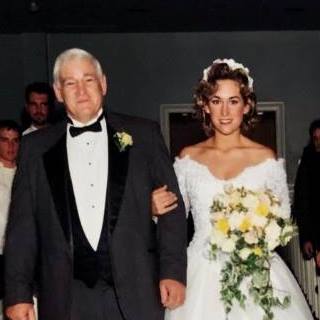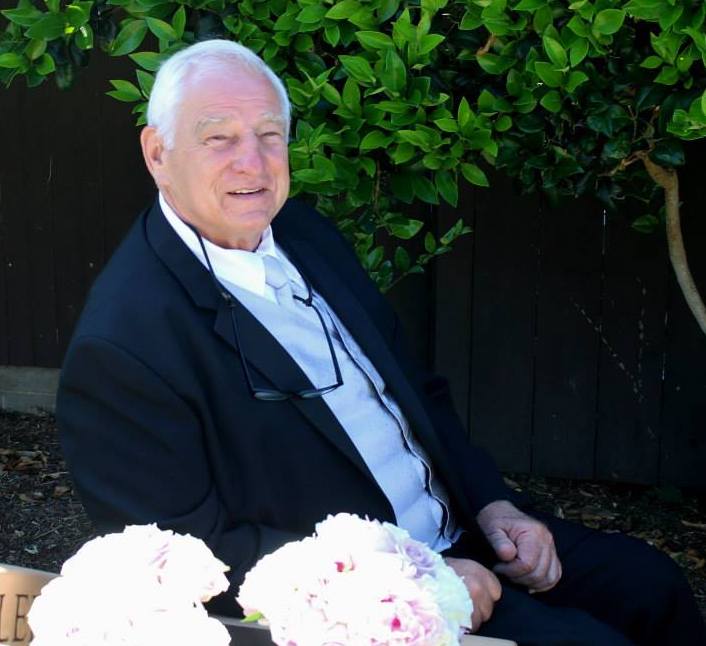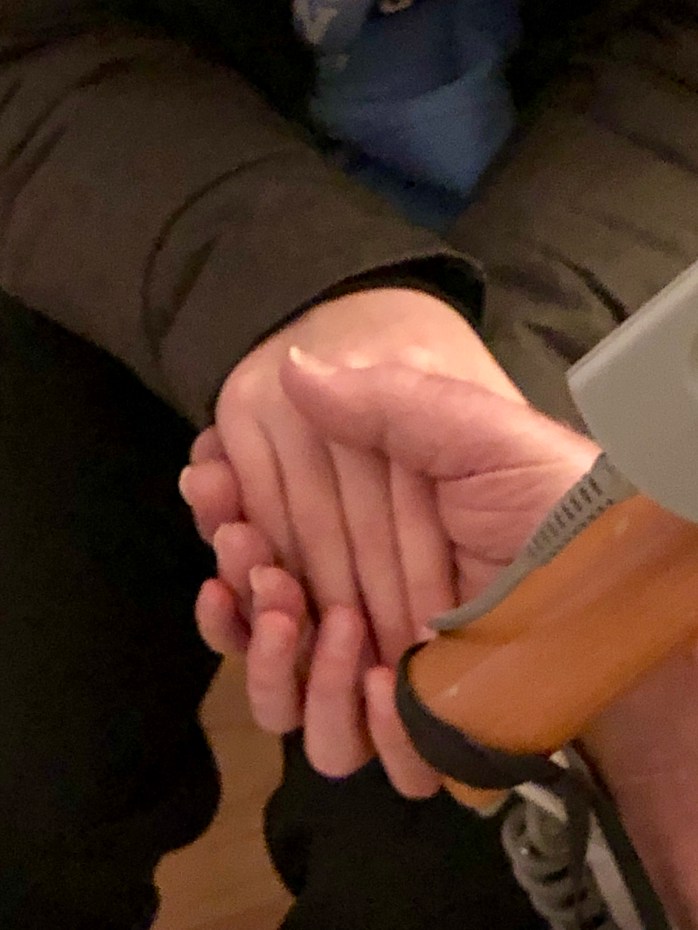on death and teaching.

I always tell my students that Life trumps School. I don’t want them worrying about a reading assignment or writing deadline when they should be caring for a post-op mom or sitting with a sick grandparent. Life is precious, our time together is limited, and our relationships with each other will always eclipse English class. Life trumps School.
Then Dad died, and all bets were off.
That wisdom I’d doled out to my students? Completely lost on me. (It was also lost on me when, at Week 37, my water broke and I was writing lesson plans.)
Unfortunately, there’s no grad class for how to grieve in a job that requires you to be “on” every minute of every day. With other jobs, you can hold your father’s hand in hospice, plan his funeral, and take the necessary time to grieve. In education, you can’t move Tuesday’s meetings to Wednesday and call it a day. Tuesday’s clients still need to learn. As proof, I remember squeezing myself into the corner of Dad’s hospice room, writing lesson plans. And his eulogy.
Today is the one year anniversary of Dad’s passing–and the first time I could write about it.
These last 12 months have brought with them many emotions and even more realizations. Here’s a list of some of what I’ve learned about death and teaching.
1) Ugly-crying in the parking lot is a thing. Crying the entire way to work was a given. It was a good day if I had left myself enough time to check myself in the rear-view mirror before heading in to the building. But most of the time, it was a mad scramble to pull my “shtuff” together as I dashed to the door. Homeroom waits for no (wo)man.
2) The show must go on has already started. Dad died the Saturday before midyear exams. If you’re not in education, midyears are to teachers what tax season is to accountants. We’re writing tests, giving tests, grading tests–all while wrapping up term grades and assessing late work and offering extra help and fielding questions from parents and answering last-minute emails from students.
And gone are the days when your sub can distribute the 200-question, multiple choice exam you wrote the week (year?) before. I assess student learning differently now, so loss or no loss, I had to leave my grief at the door (at least for those exam blocks) and get ‘er done.
They don’t teach you how to do that in grad school.
3) Funeral-planning is a beast. I don’t know how my Jewish friends pull it together in a 24- to 48-hour window. My siblings and I had a week to prepare—along with the support of Dad’s church family and the ability to divide and conquer. And it was still a full-time job. While we were trying to work our actual full-time jobs. The obituary and the order of service and the eulogy and the slideshow and the music and the meal afterwards and the constant checking in on Mom…it was just so much. There’s no education class for that.
4) It’s okay to be vulnerable. I did my best to hide my grief–or at least remain professional while ensconced in it. However, when the gashes were fresh, the students knew that, at any point, I might need to stop teaching and just take a beat. Even now, sometimes my throat will catch when talking about Dad. And while I don’t advocate becoming a blubbering mess on the daily like me in the parking lot, I think it’s good for our students to see us being human. I told them about Dad’s surgeries and about the magnitude of hitting the 1-year-cancer-free milestone. With both parents. They knew when he coded on the operating table and how, minutes later, Mom signed his DNR (i.e., the Do Not Resuscitate paperwork). They walked with me when Dad was on life support and when he was moved to hospice. And they showed grace–so much grace–when he went Home. Part of my transparency was to explain why I was absent and why their essays weren’t graded yet. The other part was because I needed their grace. As Brené Brown has taught us, there is power in vulnerability. And that power was palpable.
5) Our students love us. I was positively overwhelmed with the outpouring of kindness when Dad died. Because I allowed my students to be part of my journey, they seemed to almost grieve with me–or at least for me. I received more emails, cards, and hugs from my students than I did from adults—not because my students cared more than my peers did. Perhaps it was because teens haven’t mastered the awkwardness we adults sometimes feel around death and dying. Should I ask how he is? Has too much time passed to offer my condolences? Did she get my card? (As an aside, here’s the one thing we should never say to our grieving friends; here’s the rest of the list. And here’s what our grieving friends really need from us.) As a teacher wading through loss, it only reinforced what I already knew about my students: They’re pretty fabulous.
6) Their parents care, too. I get grunts on a good day from my own teens, so I wasn’t sure if my students’ parents knew about Dad. They did, and I was taken aback by the barrage of parent cards, emails, gifts, and baked goods we received. The common thread seemed to be how much they “appreciated my dedication” to their children in the midst of it all. I felt like a fraud. Honestly, teaching is far easier than writing sub plans for someone else who may or may not even follow them. So, for me, during those early, foggy days, it was more Path of Least Resistance than High Road of Dedication. Nevertheless, grieving as an educator meant receiving support from these amazing parents as well.
7) This is what sick days are for. I initially felt guilty missing school to be with my parents on Surgery Day, for important doctors’ appointments, during ICU stints, etc. However, my sister’s colleague reminded us that sick days exist for such a time as this. I had accrued so many over the years, rarely taking them for myself. (No heroics; I just loathe spending more time planning to be out than I would’ve spent had I just gone in!) But as one of my parents’ caregivers for the last few years, I’ve needed each and every Family Sick Day. I remember actually debating whether or not to use yet another sick day when Dad was in hospice. For all we knew, he could’ve lingered for weeks, months even. Thankfully, I shut off my inner censor and spent the day holding his hand while quietly swapping Dad Stories with my siblings. Hours later, Dad went “gentle into that good night.” This is exactly what sick days are for.
8) Grief lasts a lot longer than sympathy. One of the (many) injustices of loss is isolation. Once the services are over and the proverbial waitstaff is vacuuming around the table, that restaurant is a pretty lonely place to be. It feels like everyone else has moved on, leaving us in the wake of their sprint to life’s Next Big Event. They haven’t moved on, of course, but for the grief-stricken, it absolutely feels like it. Long after the cards and the meals and the condolences stop coming, we’re just beginning to sift through the debris of our grief. Often alone. That’s a tough–and lonely–place to exist. Especially when we have to be “on” every day.
There are a slew of other things I’ve learned in the last year, but I’ll save that for my book. I’ll simply close with this: I miss Dad something awful. But Elizabeth Kübler-Ross had it right.
“The reality is that you will grieve forever. You will not ‘get over’ the loss of a loved one; you will learn to live with it. You will heal and you will rebuild yourself around the loss you have suffered. You will be whole again but you will never be the same. Nor should you be the same nor would you want to.”
Our family’s Faith assures us that the night Dad left us, he fell–on two strong knees–before His God. No cane. No hearing aids. No pain. No cancer. Just completely Whole. And he heard his Heavenly Father say, “Well done, good and faithful servant.”
We’re one year down with a lifetime to go. And I trust there will be many more lessons to learn—and to teach—along the way.











Beautiful..Beth
LikeLiked by 1 person
Thanks so much for taking the time to read it–and for your kind words. 🙂
LikeLike
Absolutely beautiful. A must-read for anyone in or around or trying to support someone in grief. I feel like each of your points could be a whole chapter in your future book. Thank you for awakening us to your internal space and thoughts. Very courageous. Love you.
LikeLiked by 1 person
Thanks for taking the time to read this, Jen–and for, as always, your support and kind words! Love you, too!
LikeLike
Thought of my Dad this morning as it would have been his birthday! I love all you have written! Thanks for sharing your beautiful thoughts! It is a gift to us who still grieve after many years! I can only imagine the welcome and big hug my Dad gave your Dad as they met in eternal glory!💝❤️🙏🏻
LikeLiked by 1 person
Aw, happy heavenly b-day to Rev. Parry! Thanks for taking the time to read this. Looking forward to the Reunion…
LikeLike
This is beautiful.
I love that you treat your students with such respect and allow them to be a part in your life. I also love that put your family above all, while never losing sight of teacher-lady. Your dad was clearly an amazing person—apples don’t fall far—and deserved nothing less.
My dad passed over 10 years ago and I feel like the struggle, however slowly, turned to a blessing for having him to begin with. Ugly cries turn to graceful weeping, and the lessons he taught you are inclined to teach, with fervor. Taking ‘looking on the bright side’ to the extreme!
Thanks for sharing and for always treating your students like real people. ❤️🙂
LikeLiked by 1 person
Thanks so much for taking the time to read it and for your kind words. I love my dad and my students, and I’m so glad that came through here. I look forward to struggles-turned-blessings!
LikeLike
This is remarkable and holds so much truth. Thank you for sharing it.
LikeLiked by 1 person
Thanks, Erin, for investing the time to read it. I attempted to write this a slew of times over the last 12 months but wasn’t ready. I’m still a hot mess, but I felt like Dad’s one-year anniversary was as good a time as any. 🙂
LikeLike